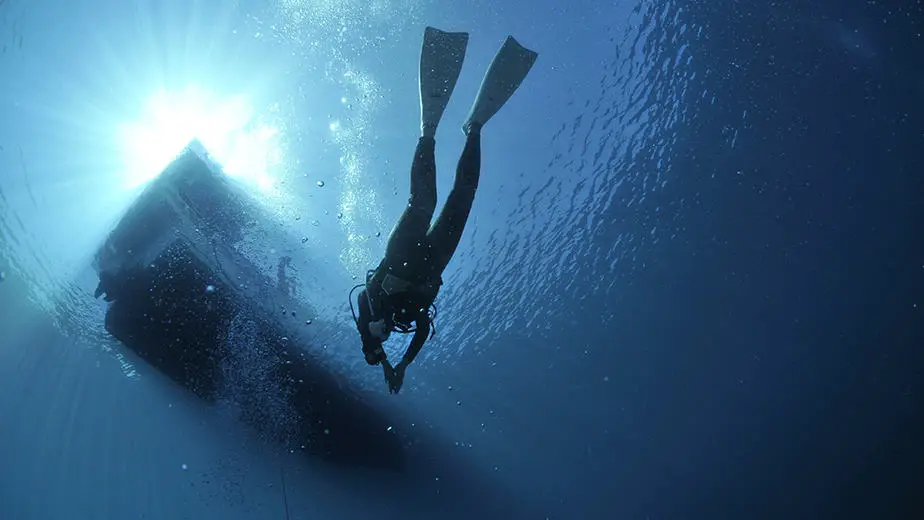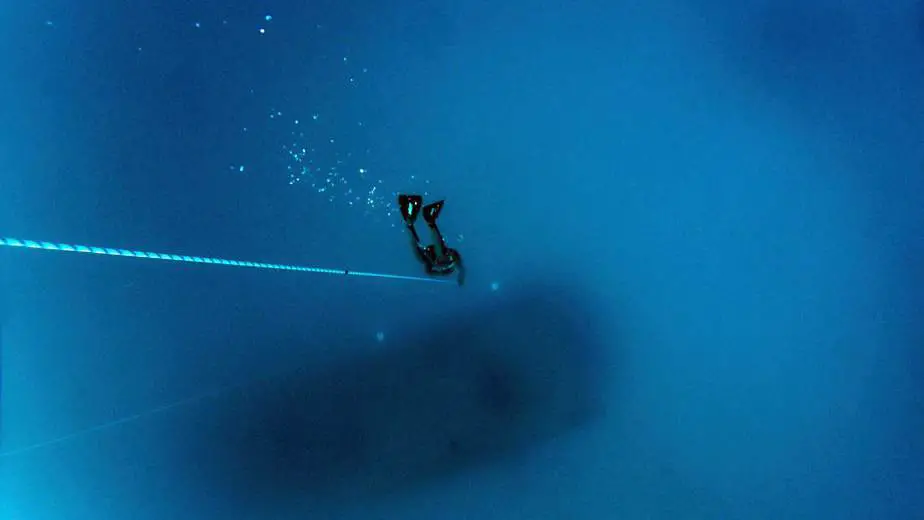When you’re freediving, you may feel your ears hurting as it expands and cracks under the water pressure until the pain is almost unbearable. Many inexperienced divers panic when they feel this and abandon their dive prematurely. There’s a lot of pressure inside your ears, and if it is not properly dealt with, it can lead to barotrauma.
Experienced freedivers know how to handle this better than anyone because it’s one of the first things they have to overcome if they plan on diving to deep depths. This guide will help you protect your ears from hurting while freediving so that you can enjoy this exciting sport to its fullest without suffering any ear injuries.
Why Do My Ears Hurt When Freediving?
Before we discuss ways to prevent ear pain, it is important that you first understand why this happens in the first place. On dry land (assuming you’re not living on a mountain or something) our bodies experience 14.5 pounds of pressure. You could say this is our “normal”, and we don’t feel any discomfort because the fluids in our body are exerting the same force outwards.
While underwater, the pressure is different, and the deeper you go the more intense the pressure gets. You might be wondering then, how do animals like whales survive at deep depths? The answer is that our bodies are vastly different.
We humans have a stiff and rigid body. On the other hand, aquatic animals have very flexible bodies that have more give. Going back to whales, they have cartilage throughout their entire body that allows them to contract without causing damage to their internal organs.
Humans have numerous air pockets throughout our body, particularly in our head. For instance, our ear canals, eye sockets, and nasal cavities all have some air within them that are necessary to regulate the pressure exerted at the surface.
However, once the pressure in those air pockets changes, such as when you’re up in an airplane or on top of a mountain, you will feel a similar painful sensation in your ears and sinuses as you would underwater. You can equalize this pressure by pinching your nose and then forcefully exhaling.
How do Professional Freedivers Prevent Their Ears from Hurting?
What separates an amateur from a professional freediver, besides experience, is their skill at equalizing pressure while underwater. This is a crucial technique that one must learn if they want to make any headway in freediving. Otherwise, one’s maximum depth will be limited by their ear’s pain threshold.
Furthermore, there is no right or wrong way to do this. Freedivers from various backgrounds with a wide range of experiences fine tune their equalization techniques to suit themselves. Additionally, everyone’s body has different limits and perhaps one technique will work better than others depending on the individual.
Professional freedivers have experimented with various methods, including how to equalize the pressure in their head just before diving. Pros may use a combination of methods or one particular method which they have perfected. Below, we will go over the most common equalization methods to help you get started.
How to Equalize Your Ears to Keep them from Hurting
Don’t worry if you aren’t doing the same secret techniques that the pros are using. In this section, we’ll cover the three most common maneuvers that will help you dive deeper than ever before without any ear pain.
Frenzel Maneuver
This maneuver was created during World War II and is named after its creator, Herman Frenzel. This method is effective even up to 85m (278ft) deep, which is more than enough for the average freediver. A simple way to describe this method is like you are sealing up your vocal cords as you are carrying a heavy weight. Here’s how to do it:
- Squeeze your nose shut with your fingers.
- Allow some air to enter your mouth.
- Close your epiglottis (the flap at the back of your mouth at the base of your tongue).
- Ensure that the soft palate of your mouth (the soft area in the upper area of the back of your throat) is not moving around.
- With your tongue acting like a piston, try to snap the air to the back of your throat.
Don’t worry if you don’t get it right the first time. These maneuvers are difficult and require much practice to perfect. You can even practice the maneuver on land, and then test it out underwater when you’re feeling ready.

The Valsalva Maneuver
The Valsalva Maneuver is one that you probably already know, as it is commonly used by people all over the world whenever they are on an airplane or high elevations. It is named after Antonio Valsava, who was one of the pioneers of the study of pressurization in the middle ear as early as the 1700s.
This maneuver is popular because of how easy it is to do; however, the downside is that it is only effective down to 30 feet, so you can think of it as a beginner technique.
In order to perform the Valsalva technique, you must:
- Squeeze your nose cavity closed using your thumb and index finger.
- Exhale forcefully through your nose while keeping it pinched.
- The trapped air will build up pressure until you hear a “pop” sound inside your ear canal.
- Perform this underwater each time you feel the pressure is too much.
Mask Equalization Maneuver
When wearing a dive mask, the pocket of air in the mask will add pressure to your eye sockets the further you dive down. You will need to equalize the pressure in the mask as well as your ears, otherwise you risk suffering damage to your eyes and ears. Using the mask equalization maneuver, you can relieve the pressure and prevent damage to your face.
In order to perform the Mask Equalization Maneuver, you must:
- Ensure that the dive mask has a soft nose pocket that can be easily pinched with just one hand (so that you can still equalize the pressure on your ears).
- Exhale slightly through your nose until the pressure has subsided.
The mask equalization technique is such a straightforward technique, however you need to keep a few things in mind. First, exhaling too much obviously uses up precious oxygen that you need to stay underwater longer.
Second, when you exhale, you are introducing moisture and heat into the mask that can condense on the lens and fog it up. That is why it is recommended you search for low volume dive masks because they require less air to equalize and also gives you a better view with fewer obstructions.
Ear Pressure Equalizing Tips
Stay Hydrated
Staying hydrated is crucial when performing any physical activity, and this one is no exception. Make sure you are drinking lots of fluid throughout the diving session.
Medication
Before taking any medication, especially if you are already on medications, consult your doctor to see if there are any contraindications or warnings you should heed.
With that said, Mucinex is a great expectorant for getting rid of mucus in your nose, ears, and sinuses. While Afrin and Sudafed can also clear your ears, they are accelerants which will increase your heart rate which is like kryptonite for freedivers.
With your airways fully clear, you do not have to worry about restricted air flow that can limit your diving potential. You can get these benefits by taking Mucinex two days prior to your dive attempts. You do not need medication to be a successful freediver, but it may be helpful.
Tuck Your Chin
If you are struggling to equalize your ears, try tucking your chin in so that you are not looking at the bottom, and then try one of the equalization techniques. If you’re craning your neck and looking straight down while diving, it may make equalizing more difficult.
Equalize Before It’s Needed
Don’t wait until you are at your pain threshold before deciding to equalize your ears. You should be relieving the pressure well before any significant discomfort or pain occurs. If in doubt, just keep your hand on your nose the whole time so that you are always ready to equalize.
Freediving Ear Care
One simple way to drastically reduce the chances of contracting an ear infection is to make a homemade solution of half vinegar and half rubbing alcohol. The alcohol will quickly evaporate any lingering water after a dive. Next, the acidity of the vinegar will prevent any bacteria growth. After a dive, apply two drops into each ear to unclog your ears and prevent ear infections in the future.
Additional Safety Tips
The golden rules of freediving are that you must always have a spotter with you on a dive, and you must equalize your ears before you experience any pain.
It should be pretty obvious why you shouldn’t dive alone. If you were to lose consciousness due to a shallow water blackout, your life is as good as over. Additionally, if the weather conditions are bad enough, you can get lost or experience an accident underwater or topside. If your eardrums suddenly rupture, you’ll be glad you’ve got somebody to watch your back.
However, if you follow the second rule of equalizing before the pressure becomes too unbearable, then you shouldn’t have to worry about a perforated eardrum. Yes, using any of the pressure equalizing maneuvers above will use up pressure energy and oxygen. However, suffering a pressure related injury to your skull is not worth the risk just to get a few extra meters of depth.
Pay attention to your body because it is constantly giving you feedback regarding its condition. Always err on the side of caution.
The sport of freediving has been around for hundreds of years, as humans continue to push their limits underwater. It may seem daunting at first; you might think professional freedivers are half-fish with their ability to stay underwater for several minutes and dive over 100m on a single breath.
However, these pros were once like you when they were starting out, and it was through constant training and experience that they achieved this level of competency. By learning the basics of how to free dive without ears hurting, you can dive further than when your limiting factor was pain in your ears.

